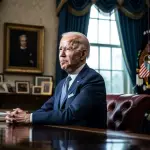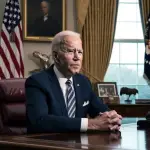House lawmakers got into a heated argument at a Natural Resources oversight subcommittee hearing on Tuesday about whether the Department of the Interior is giving too much power to nonprofit activist groups and private companies.
Republicans on the oversight and investigations panel of the committee, led by Chairman Paul Gosar of Arizona, accused DOI Secretary Deb Haaland of having close and potentially improper relationships with “radical” nongovernmental organizations that are pushing the Biden administration’s extreme environmental agenda.
Ms. Haaland is scheduled to testify before the full committee on Wednesday.
Lawmakers clash over environmentalist groups’ influence on Interior Departmenthttps://t.co/Qtq70IUny8 pic.twitter.com/rc62iNy5xD
— The Washington Times (@WashTimes) May 1, 2024
Chairman Gosar explained that the problem lies in the fact that many of these groups fundamentally oppose the missions of the land management agencies that they are trying to influence. He also brought up concerns about some of these groups receiving funding from foreign sources like China.
He specifically mentioned the leftwing protest group Code Pink and expressed worries that “radical environmental groups” are influencing key decisions and rulemaking at DOI relating to resource development. These decisions include the Chaco Canyon withdrawal and the cancellation of the twin metals mineral releases in the Superior National Forest.
Mr. Gosar also brought up Ms. Haaland’s relationship with the Pueblo Action Alliance, a leftist Native American organization, and expressed concerns about her close ties to the group. On the other hand, the top Democrat on the committee, Rep. Melanie Stansbury of New Mexico, dismissed the accusations against Ms. Haaland as “partisan attack” and defended her as the “nation’s very first indigenous Cabinet secretary.”
Ms. Stansbury criticized the Trump administration’s DOI for having “dozens of scandals and ethical violations” and accused them of offering special interests unprecedented access. The Interior Department declined to comment on the matter.
At the hearing, witnesses discussed how the department works with activist organizations and others during the rule-making process, and Republicans on the committee want to focus on the issue of “ex parte communication,” which refers to oral communications during face-to-face meetings between stakeholders and agency personnel that are not part of the written comments submitted during the comment period. This is an issue that Republicans are concerned the APA does not adequately address.
The committee also talked about how the DOI carries out formal and informal rulemaking processes. They highlighted that informal rulemaking, known as “notice and comment,” happens more often, and there are concerns about the lack of restrictions on oral communications during this process.
The hearing also featured testimony from Scott Walter, president of the Capital Research Center; Tyler O’Neil, author of “Making Hate Pay: The Corruption of the Southern Poverty Law Center;” and Richard Painter, S. Walter Richey Professor of Corporate Law at the University of Minnesota Law School. Mr. Walter testified about foreign nationals donating to American super PACs that end up supporting environmental organizations. Mr. Painter called for tightening ethics rules at the Interior Department.
Notably, witnesses from the Wilderness Society and Pueblo Action Alliance declined an invitation to testify.
It is clear that this hearing brought to light the ongoing tensions and concerns about the DOI’s relationship with activist organizations and the influence of such groups on the decision-making process within the department.




